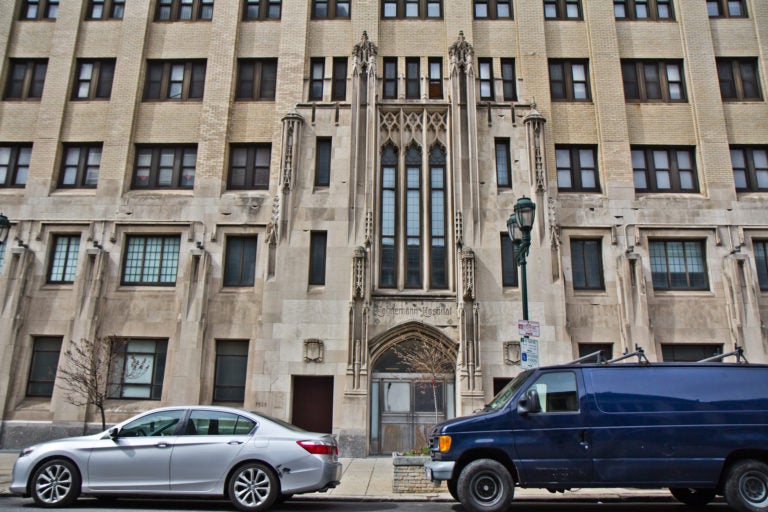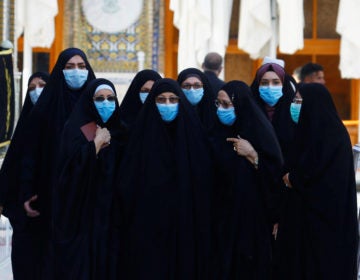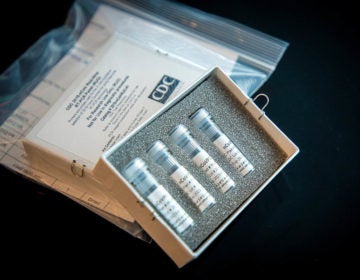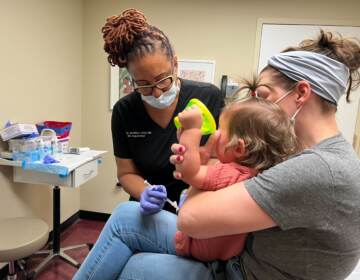Hahnemann building eyed as option for overflow in case of COVID-19 outbreak
The city’s hospitals are too full to handle a coronavirus outbreak, so officials are looking for a space to accommodate patients or those in quarantine.

The shuttered Hahnemann Hospital building in Philadelphia. (Kimberly Paynter/WHYY)
Philadelphia’s hospitals do not have space to accommodate a surge in patients that could result from COVID-19, their leaders say.
“I’d be surprised if any of us has more than a few beds on any day that are capable of being used for COVID-19 patients,” Patrick Brennan, chief medical officer at the University of Pennsylvania Health System, said Wednesday at a city symposium on the coronavirus and the illness it causes.
Brennan’s concern was echoed by hospital administrators from Einstein and Jefferson.
“Our hospital has been running pretty close to full every day, so a significant influx of patients would be challenging to handle,” said Eric Sachinwalla, an infectious-disease specialist at Einstein.
Brennan said there is physical space at various Penn Health System hospitals that could be used if necessary — but that cafeterias and lobbies are a last resort.
“Those are really undesirable places to put patients,” he said.
For that reason, the city Department of Public Health is actively looking for overflow space where sick patients could go to be treated, or exposed patients could wait while in quarantine.
One obvious option is the former Hahnemann University Hospital building, since the shortage of beds is due in large part to the safety-net hospital’s closure in summer 2019. Before it closed, the 496-bed hospital saw roughly 150 emergency room patients a day. Philadelphia Health Commissioner Thomas Farley said he thinks using the building is a stretch, however, given its current state.
“The idea has been raised, and we’ve tried to put inquiries in with the people who control that building to see if there’s a way to make that a healthcare facility,” said Farley of the former hospital building at Vine and Broad, which has been without patients since August of last year. “It would not be a simple task by any means because it’s been decommissioned and my understanding is that there are no beds and no staff there. However, we are looking into it.”
Joel Freedman, the Hahnemann building’s owner, could not immediately be reached for comment.
Health Department spokesman Jim Garrow added that the city is actively pursuing other options, as well.
Because capacity is low, the health care systems are encouraging patients to stay out of the hospital or doctor’s offices whenever possible, whether they are coming in for unrelated procedures or illnesses or if they are worried they might have contracted the novel coronavirus.
Brennan said his staff is thinking about how to shift elective procedures and other nonessential medical care that can be rescheduled, to make room for potential COVID-19 patients.
“The intention of all of us should be to identify patients and keep them out of the facility as much as possible,” he said.
Approximately 80% of those who contract COVID-19 don’t require hospitalization.
Farley stressed that the same principle of triaging should be applied to testing.
“We can’t open up criteria for testing much right now because then we would exhaust all our testing supplies and not be able to test the patients who need it the most,” Farley said. As of now, the city recommends testing only for those with symptoms of the illness — fever and dry cough — and who either traveled to an area where the disease is prevalent or may have been exposed to someone who had it.
JeffConnect, Jefferson’s telehealth service, has seen a 30% to 50% increase in its on-demand program over the last two days, according to Judd Hollander, vice chair of finance and healthcare enterprises in the Department of Emergency Medicine at Jefferson.
Independence Blue Cross covers telemedicine for primary care, and chief medical officer Richard Snyder said he planned to expand that policy as soon as Wednesday afternoon to cover specialty visits through telemedicine with no copay. He also said he has removed the “refill too soon” trigger, to allow patients to stock up on prescription medications.
There is no plan, however, for patients who may become ill or need to self-quarantine who have to travel to a clinic daily to receive their medication, such as those on methadone maintenance or dialysis.
“We haven’t heard of any best practice for that situation nationally,” said Garrow. “We understand that this is a sticky question.”
WHYY is your source for fact-based, in-depth journalism and information. As a nonprofit organization, we rely on financial support from readers like you. Please give today.




![CoronavirusPandemic_1024x512[1]](https://whyy.org/wp-content/uploads/2020/03/CoronavirusPandemic_1024x5121-300x150.jpg)



